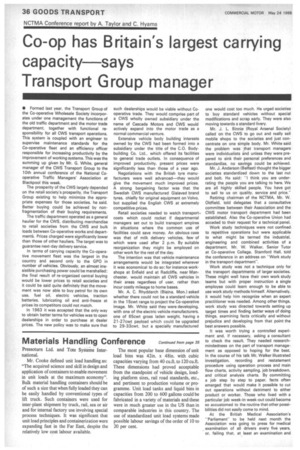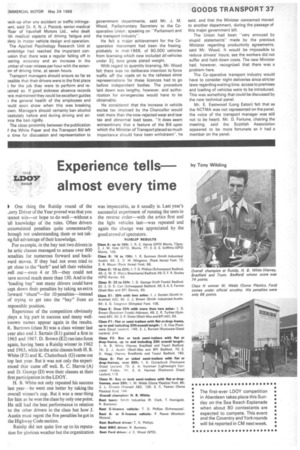Co-op has Britain's largest carrying capacity says Transport Group manager
Page 38

Page 39

If you've noticed an error in this article please click here to report it so we can fix it.
• Formed last year, the Transport Group of the Co-operative Wholesale Society incorporates under one management the functions of the old traffic department and the motor trade department, together with functional responsibility for all CWS transport operations, This system is coupled with an engineer to supervise maintenance standards for the Co-operative fleet and an efficiency officer responsible for increasing productivity by the improvement of working systems. This was the summing up given by Mr. G. White, general manager of the CWS Transport Group to the 10th annual conference of the National Cooperative Traffic Managers' Association at Blackpool this week.
The prosperity of the CWS largely depended on the retail society's prosperity, the Transport Group existing to help minimize the appropriate expenses for those societies, he said. Better buying could be achieved by nonfragmentation of their buying requirements.
The traffic department operated as a general haulier for the CWS, distributing merchandise to retail societies from the CWS and bulk loads between Co-operative works and department. Prices charged were significantly lower than those of other hauliers. The target was to guarantee next-day delivery service.
In terms of carrying capacity the Co-operative movement fleet was the largest in the country and second only to the GPO in number of vehicles. Obviously, an almost irresistible purchasing power could be marshalled; the final result of re-organized central buying would be lower prices to retail societies and it could be said quite definitely that the movement was now able to buy petrol for its own use, fuel oil, electric vehicles, traction batteries, lubricating oil and anti-freeze at prices its competitors could not match.
In 1963 it was accepted that the only way to obtain better terms for vehicles was to open dealerships in order to purchase at dealer prices. The new policy was to make sure that such dealerships would be viable without Cooperative trade. They would comprise part of a CWS wholly owned subsidiary under the name of Cascade Motors and CWS would actively expand into the motor trade as a normal commercial venture.
Extensive vehicle body building interests owned by the CWS had been formed into a subsidiary under the title of the C.O. Bodybuilding Co. Ltd., which offered its facilities to general trade outlets. In consequence of improved productivity, present prices were significantly less than those of a year ago.
Negotiations with the British tyre manufacturers were well advanced—they would give the movement much improved prices. A strong bargaining factor was that the Swedish CWS manufactured Gislaved brand tyres, chiefly for original equipment on Volvo, but supplied the English CWS at extremely competitive prices.
Retail societies needed to watch transport. costs which could rocket if departmental managers set out to build transport empires in situations where the common use of facilities could save money. An obvious case was that of milk delivery vehicles, few of which were used after 2 p.m. By suitable reorganization they might be employed on other work for the rest of the day.
The intention was that vehicle maintenance arrangements would be integrated wherever it was economical to do so; for instance workshops at Enfield and at Radcliffe, near Manchester, would maintain all CWS vehicles in their areas regardless of user, rather than incur costly mileage to home bases.
Mr. A. C. Rhydderch (Blaine, Mon.) asked whether there could not be a standard vehicle in the 15cwt range to project the Co-operative image. Mr. White said they were developing, with one of the electric vehicle manufacturers, one of 65cwt gross laden weight, having a 21-27cwt payload which could be upgraded to 29-33cwt, but a specially manufactured
one would cost too much. He urged societies to buy standard vehicles without special modifications and scrap early. They were also moving towards a standard livery.
Mr. J. L Binnie (Royal Arsenal Society) called on the CWS to go out and really sell mobile shops to the societies and just concentrate on one simple body. Mr. White said the problem was that transport managers were individualists and unless they were prepared to sink their personal preferences and standardize, no savings could be achieved.
Mr. J. Anderson (Belfast) thought the bigger societies standardized down to the last nut and bolt. He said: "I think you are underrating the people you are talking to here. We are all highly skilled people. You have got to sell to us on quality, service and price."
Retiring chairman of the NCTIVIA, Mr. W. OlcIfield, told delegates that a consultative committee between their Association and the CWS motor transport department had been established. Also the Co-operative Union had acceded to their request for a technical panel.
Work study techniques were not confined to repetitive operations but were applicable to what might be termed the industrial, engineering and combined activities of a department, Mr. W. Walker, Senior Tutor at Co-operative College, Stamford Hall, told the conference in an address on "Work study in the transport department".
Work study was not a technique only for the transport departments of larger societies. These might well have their own work study teams but with proper instruction a single employee could learn enough to be able to use work study methods himself. Alternatively, it would help him recognize when an expert practitioner was needed. Among other things, work study was directed towards setting up target times and finding better ways of doing things, examining facts critically and without prejudice and developing from that point the best answers possible.
It was worth trying a controlled experiment and, if necessary, asking a consultant to check the result. They needed researchmindedness on the part of transport management as opposed to hoping for the best In the course of his talk Mr. Walker illustrated investigation, recording and restatement procedure using operation process and main flow charts, activity sampling, job breakdown, and critical analysis charts. By committing a job step by step to paper, facts often emerged that would make it possible to cut Out operations without detriment to either product or worker. Those who lived with a particular job week-in week-out could become so accustomed to the routine that other possibilities did not easily come to mind.
At the British Medical Association's "Parliamentto be held next month the Association was going to press for medical examination of all drivers every five years, or, failing that, at least an examination and
leek-up after any accident or traffic infringelent, said Dr. K. N. J. Pocock, senior medical Pricer of Vauxhall Motors Ltd., who dealt ith medical aspects of driving fatigue and tfety in motor vehicle design and operation. The Applied Psychology Research Unit at ambridge had reached the important conusion that there was a regular falling off in :eering accuracy and an increase in the amber of near-misses per hour with the extenon of driving time, at seven hours.
Transport managers should ensure so far as ossible that their drivers were in the first place t for the job they were to perform and retained so. If good sickness absence records 'ere maintained they could be excellent guides ) the general health of the employees and rould soon show when this was breaking own. Managers should certainly ban alcohol bsolutely before and during driving and en)rce the ban rigidly.
The close proximity between the publication f the White Paper and the Transport Bill left o time for discussion and representation to government departments, said Mr. J. M. Wood, Parliamentary Secretary to the Cooperative Union, speaking on "Parliament and the transport industry".
He felt a major achievement for the Cooperative movement had been the freeing, probably in mid-1969, of 90,000 vehicles from licensing which now included all vehicles under 3tons gross plated weight.
With regard to quantity licensing, Mr. Wood felt there was no deliberate intention to force traffic off the roads on to the railways since representations for these licences had to go before independent bodies. The procedure laid down was lengthy. however, and authorization for emergencies would have to be obtainable.
He considered that the increase in vehicle excise tax imposed by the Chancellor would cost more than the now-rejected wear and tear tax and abnormal load taxes. "It does seem extraordinary that a feature of the Bill upon which the Minister of Transport placed so much importance should have been withdrawn". he said, and that the Minister concerned moved to another department, during the passage of this major government bill.
The Union had been "very annoyed by stupid statements" made by the previous Minister regarding productivity agreements, said Mr. Wood. It would be impossible to reduce drivers' hours, see the workers did not suffer and hold down costs. The new Minister had, however, recognized that there was a problem here.
The Co-operative transport industry would have to consider night deliveries since stricter laws regarding waiting time, access to premises and loading of vehicles were to be introduced. This was something that could be discussed by the new technical panel.
Mr. E. Eastwood (Long Eaton) felt that as the NCTMA was not represented on the panel, the voice of the transport manager was still not to be heard. Mr. D. Fortune, chairing the meeting, said the Scottish Association appeared to be more fortunate as it had a member on the panel.








































































































































